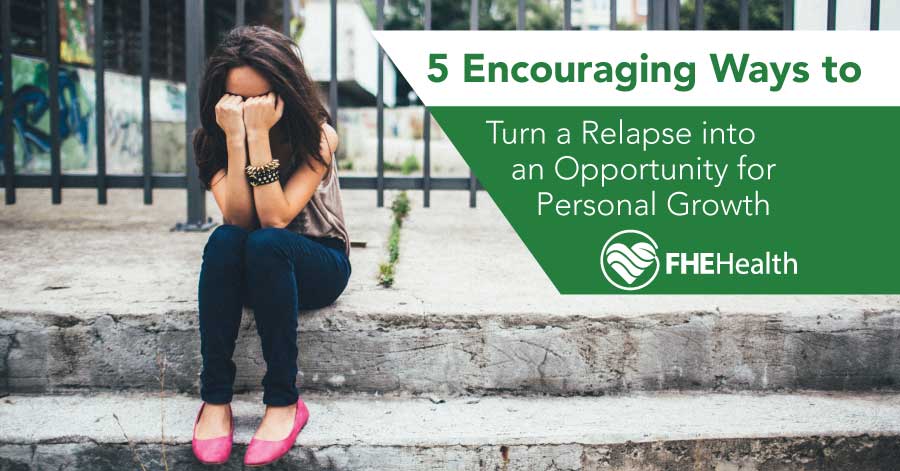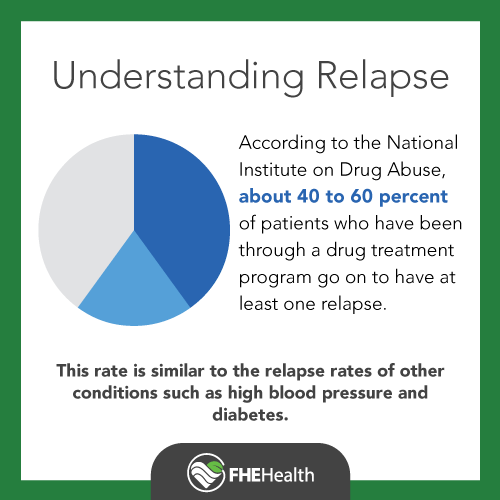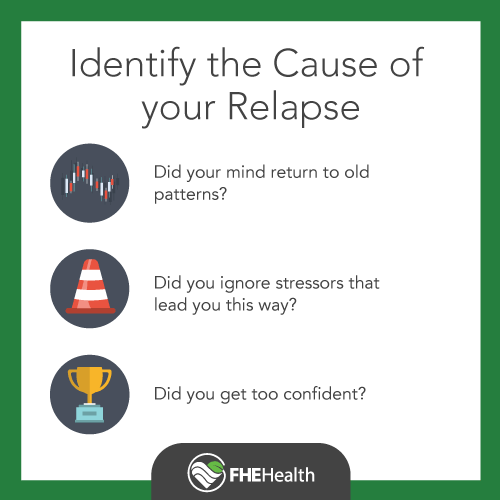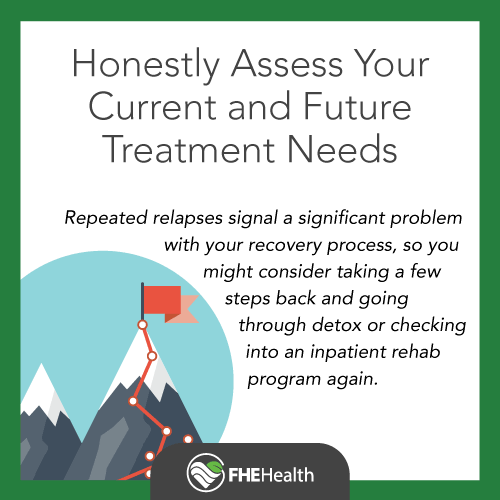
When you’ve worked hard to achieve sobriety, a relapse might make you feel as though you’ve failed. Relapses don’t have to be the end of your recovery process, though. Knowing what to do after relapse can be the difference between long-term success and a rockier path. If you handle it correctly, a relapse can be an opportunity to improve how you move forward into a life free of drugs and alcohol.
Understanding Relapses
 Relapses occur when you return to using drugs or alcohol after completing a recovery program. While it can feel devastating to slip up after so much hard work, relapses don’t have to be a permanent setback.
Relapses occur when you return to using drugs or alcohol after completing a recovery program. While it can feel devastating to slip up after so much hard work, relapses don’t have to be a permanent setback.
Relapses are fairly common. In fact, most people go through at least one relapse after treatment, so relapses could be considered a normal part of addiction recovery. According to the National Institute on Drug Abuse, about 40 to 60 percent of patients who have been through a drug treatment program go on to have at least one relapse. This rate is similar to the rates of relapses for other chronic illnesses, such as asthma and high blood pressure, which indicates that recovery from addiction is similar to recovery from other diseases.
What to Do After a Relapse
After a relapse, you might experience feelings of frustration, anger or depression. Working through your feelings and recognizing that relapses are a common part of a recovery journey can help you move forward. Spending a lot of time dwelling on your relapse or treating it as though there’s no way to recover makes progress more difficult. Instead, seek out support to get back on track and recommit yourself to a drug- and alcohol-free life.
5 Ways to Turn Your Relapse into an Opportunity
Remember, relapses don’t have to be the end of your recovery. Slipping up during the process is completely normal. The choices you make after relapse are more important than the fact that you slipped up. Here are some distinct steps you can take to turn your relapse into an opportunity and move forward with recovery:
1. Identify the cause of your relapse
 Determining why you had a relapse can help you prevent future relapses. Use your addiction relapse as a learning experience to figure out situations or settings you need to avoid.
Determining why you had a relapse can help you prevent future relapses. Use your addiction relapse as a learning experience to figure out situations or settings you need to avoid.
If you determine that your relapse occurred because you returned to a place your mind associates with drug or alcohol use, you can stay away from that place to aid recovery. If yours was a relapse of opportunity, focus on finding alternative choices you can make the next time you’re offered drugs or alcohol and practice specific methods to avoid those situations in the future.
Your relapse might also be related to emotional or physical needs. If you turned to drugs or alcohol to relieve pain or stress, talk to your doctor or therapist about other ways to handle those conditions instead of returning to substance abuse.
For some people, relapses are a result of overconfidence. If you’ve been sober for a while and feel as though you can handle exposure to drugs or alcohol without falling into a full addiction again, you might be tempted to join in a celebration or participate with friends who are drinking or doing drugs. Relapses caused by overconfidence may require that you recognize the fact that the job of recovery is never truly over and vigilance is necessary even when you’ve been sober for a long time.
2. Engage with your support system
Your relapse might have happened because you lost touch with your support system, or it might have occurred despite having a robust group of friends, family members and professionals working to help you stay sober. No matter how your prior relationships were with members of your support system, use your relapse as an opportunity to make those relationships stronger.
You might feel embarrassed or nervous about telling your support system that you messed up, but sharing the details of your relapse can help those people help you. A peer group or mentor might offer support and advice on how they dealt with their own relapses, while family and friends can encourage you to move forward and cheer you on as you work toward your sobriety goals.
3. Honestly assess your current and future treatment needs
 In some cases, a relapse might be a sign that you need to return to a treatment program. If your relapse involved a single slip-up, you may be able to avoid future slips through simple lifestyle changes. Repeated relapses signal a significant problem with your recovery process, so you might consider taking a few steps back and going through detox or checking into an inpatient rehab program again. You might also benefit from moving into a sober living facility for a while to surround yourself with the support of peers going through the same struggles and effective aftercare services that help you resist future relapses.
In some cases, a relapse might be a sign that you need to return to a treatment program. If your relapse involved a single slip-up, you may be able to avoid future slips through simple lifestyle changes. Repeated relapses signal a significant problem with your recovery process, so you might consider taking a few steps back and going through detox or checking into an inpatient rehab program again. You might also benefit from moving into a sober living facility for a while to surround yourself with the support of peers going through the same struggles and effective aftercare services that help you resist future relapses.
Talking with a counselor or peer support group can help you assess what steps you need to take to avoid future relapses. If you suspect you need help to prevent another slip-up, don’t hesitate to seek out support.
4. Use your relapse as motivation to continue learning and growing in your recovery
A relapse often brings up negative feelings about your self-worth and your own ability to recover, but you can also use a relapse to renew your focus toward eventual success. Try to view your relapse as a temporary setback instead of a definitive ending.
Some people who relapse during recovery think they need to wait until they feel stronger or until their life situation is better to continue recovery. In truth, using your relapse as motivation to move forward with recovery is a better choice. Recognize that self-doubt after a relapse is perfectly normal, but also recognize that relapses are a common part of any recovery program and not a reflection on your personal strength or ability to succeed.
5. Recommit to healthy life choices
Keep in mind that a sober lifestyle is a healthy lifestyle, and use your alcohol or drug relapse to recommit to healthy choices. You’ve successfully made healthier choices in the past and can do so again.
Self-care is an essential part of relapse prevention, so take some time to focus on your physical and emotional needs after a slip-up. Mindfulness exercises, yoga, journaling and enjoying healthy foods can all put you into a healthier state that makes it easier to stay sober in the future. Tension and stress make future relapses more likely, while peace of mind and an overall healthy lifestyle protect against temptations that may lead to another relapse.
If you or someone you love has experienced a relapse after treatment, don’t be afraid to reach out for help getting back to a sober lifestyle. Our team of counselors is available 24/7, so give us a call at (833) 596-3502 and renew your focus on recovery today.






